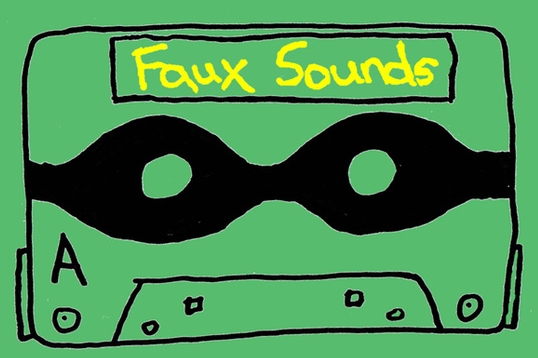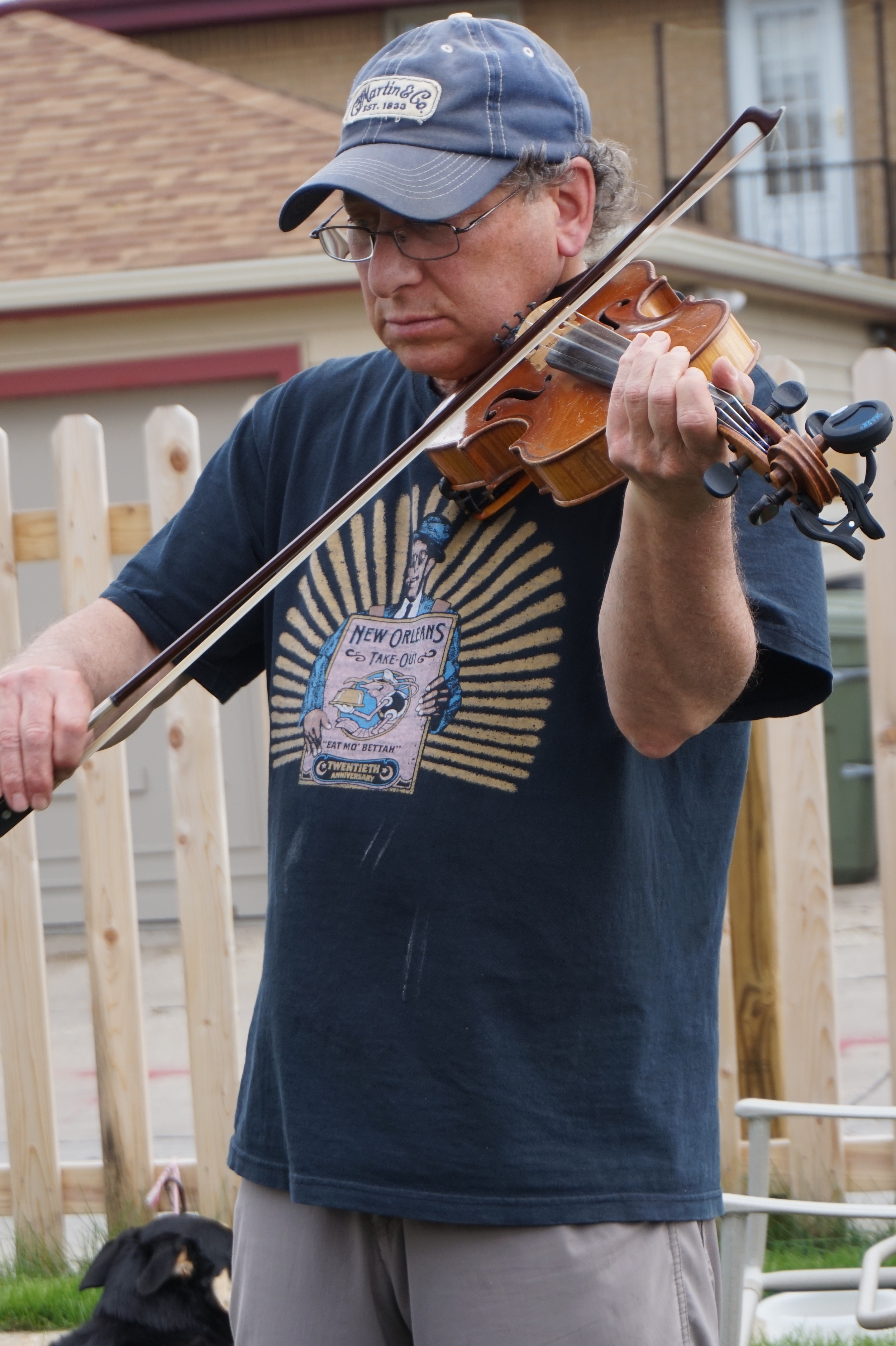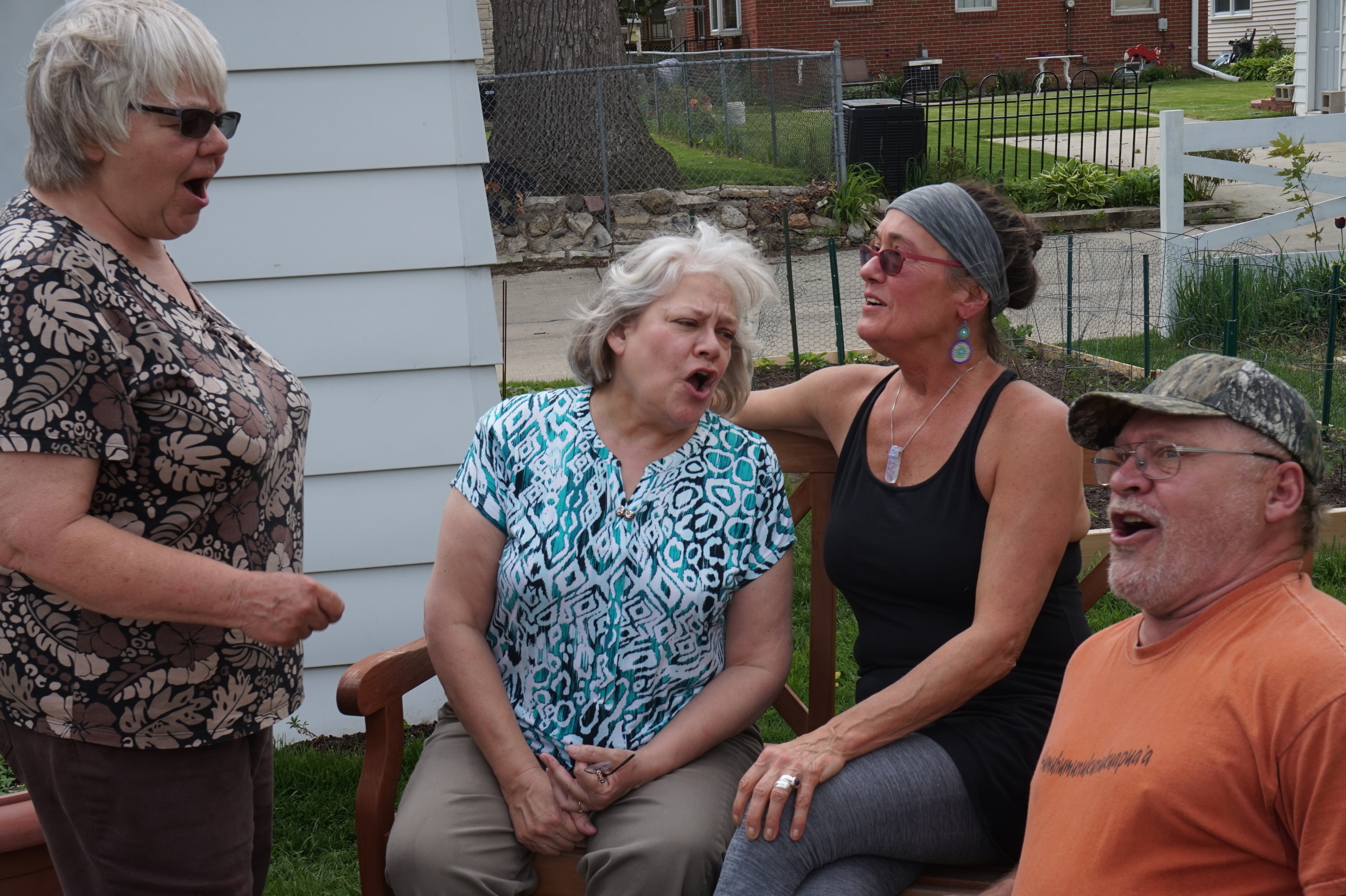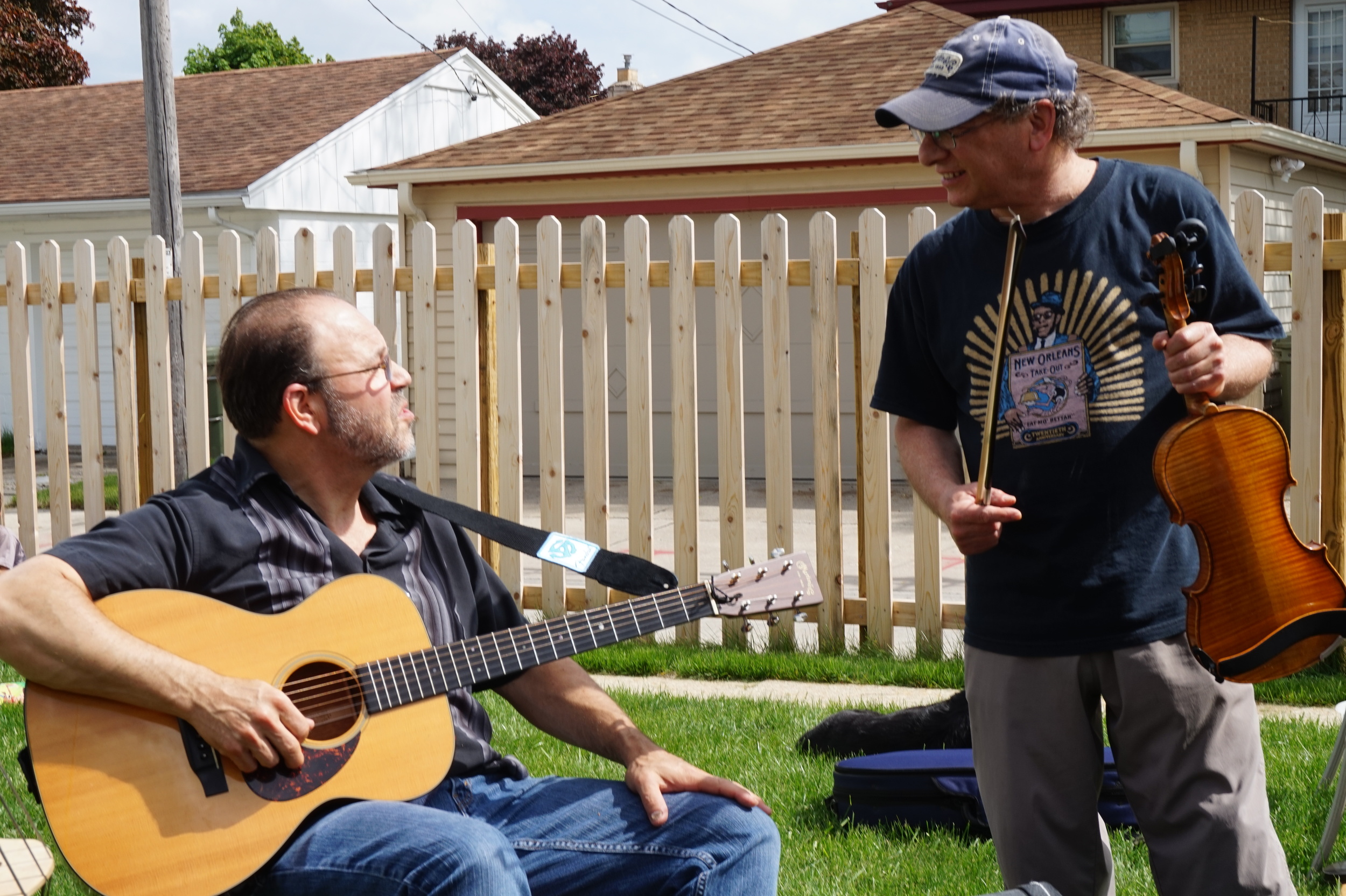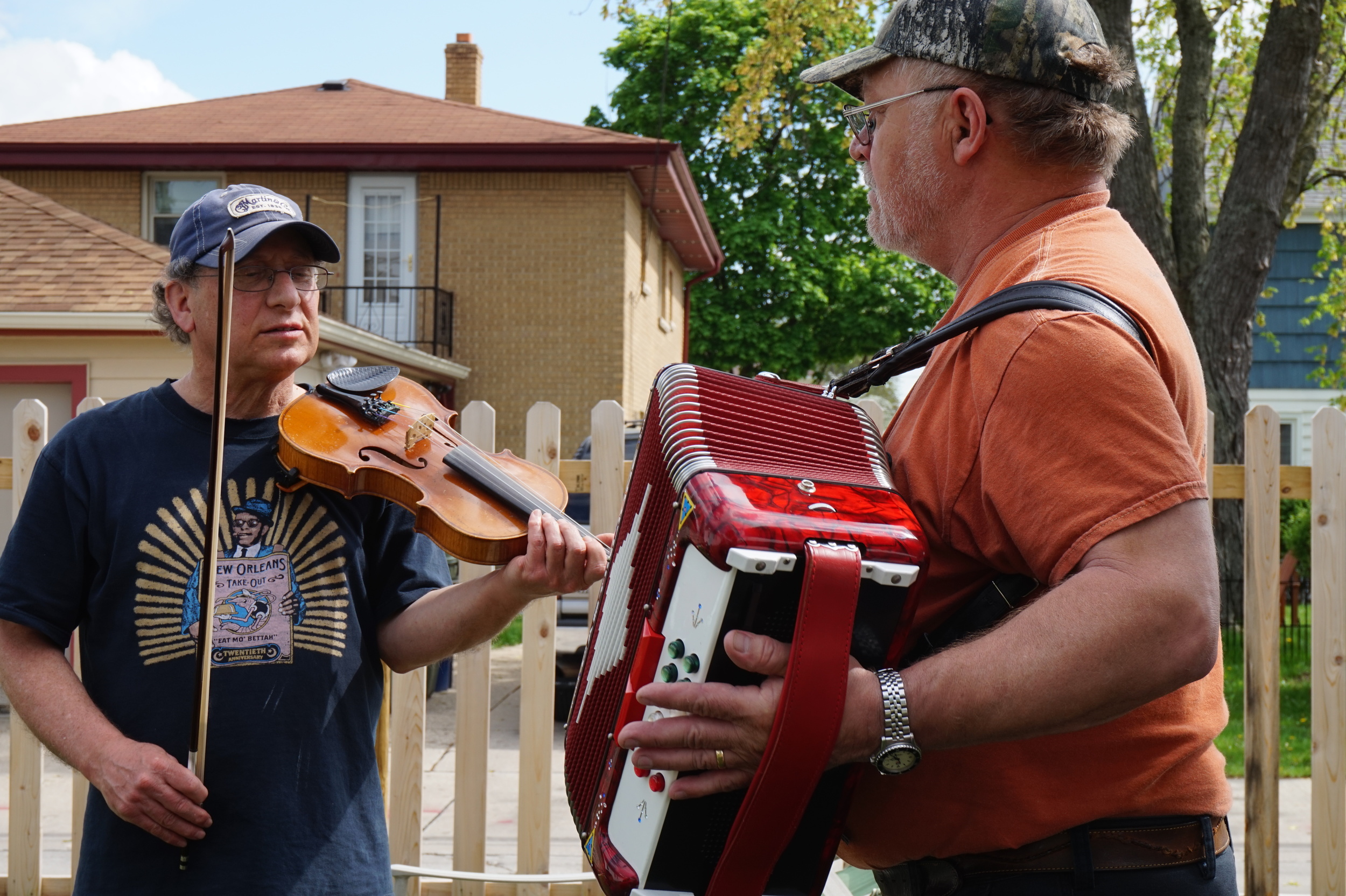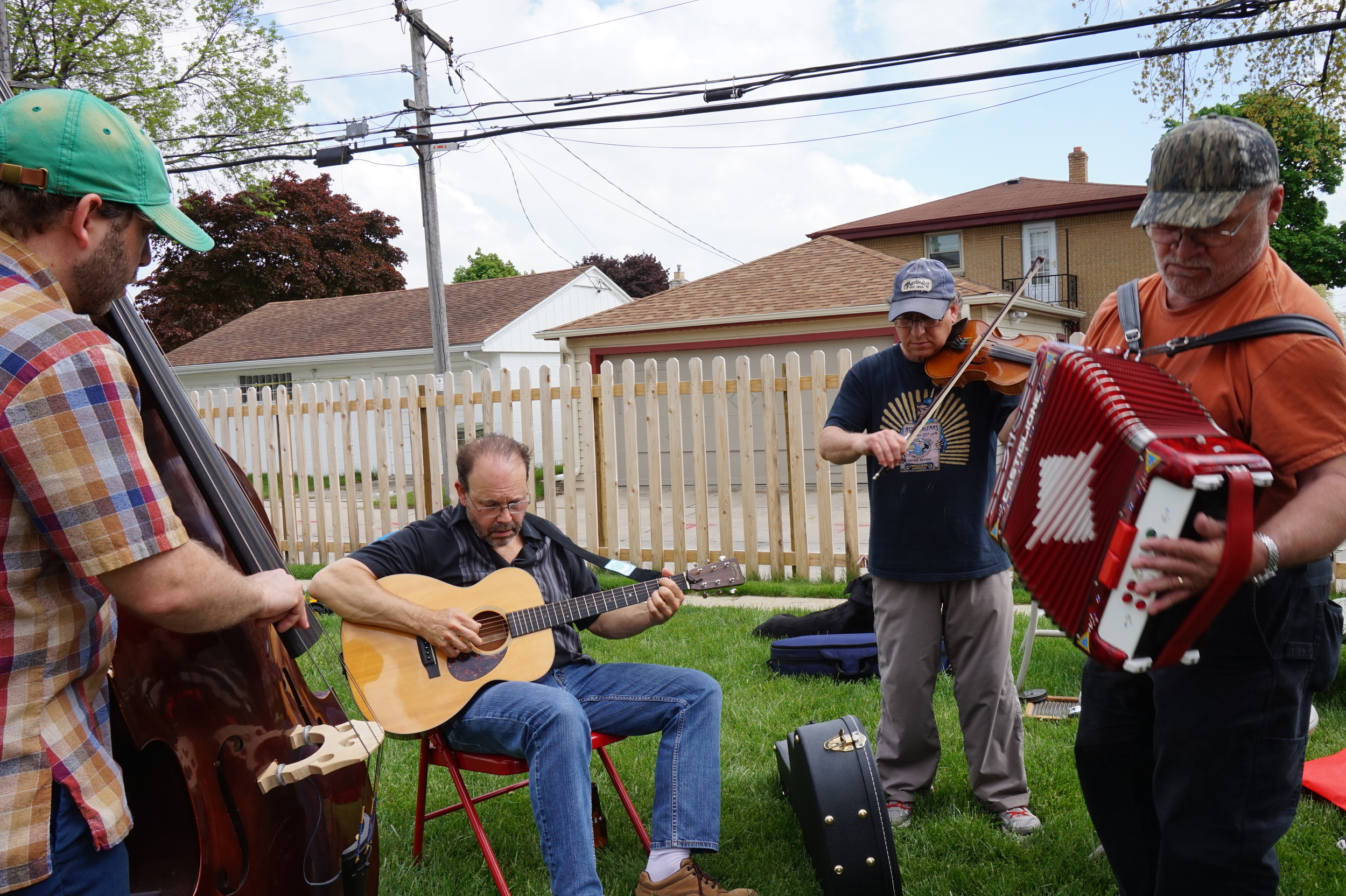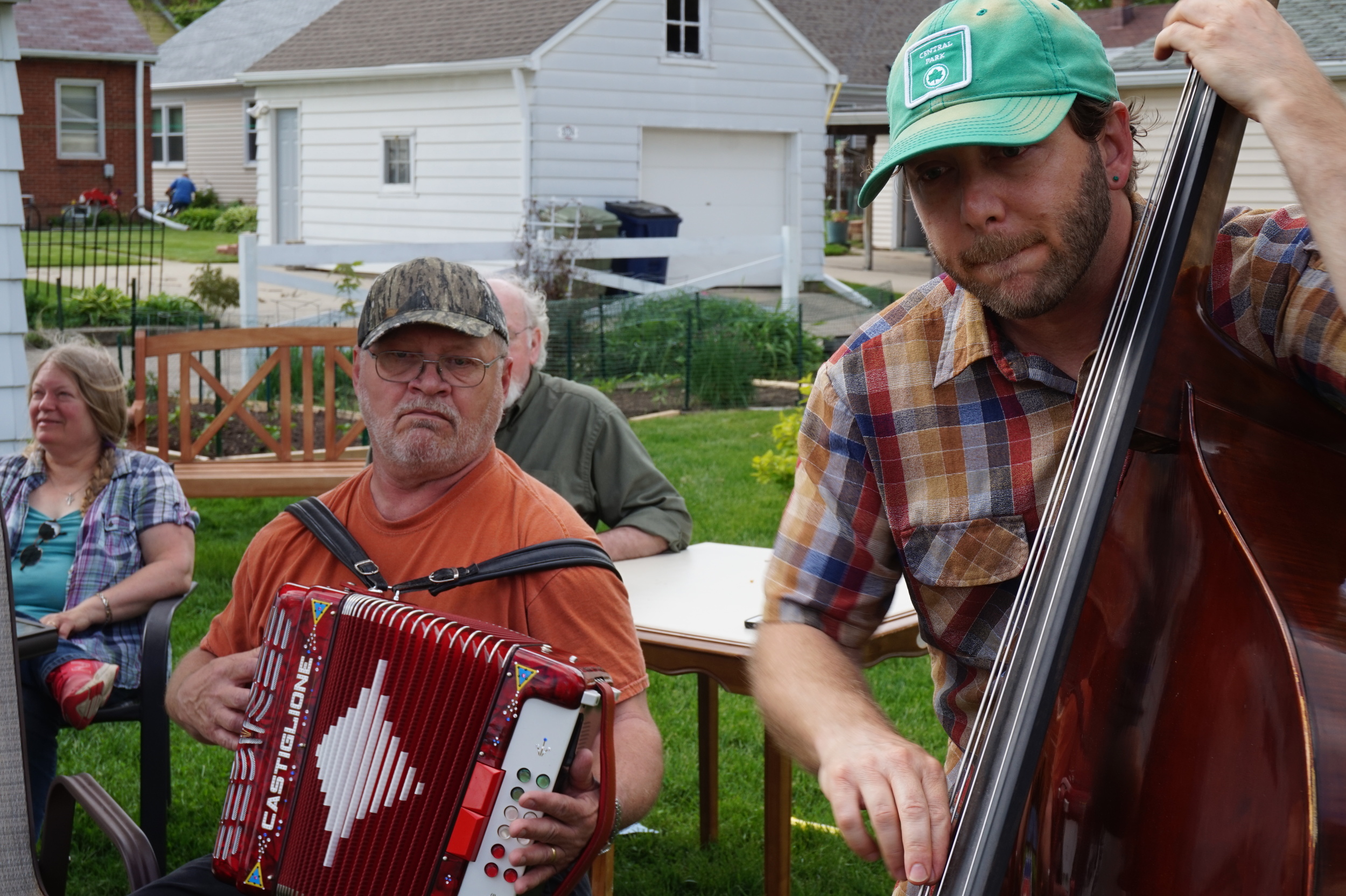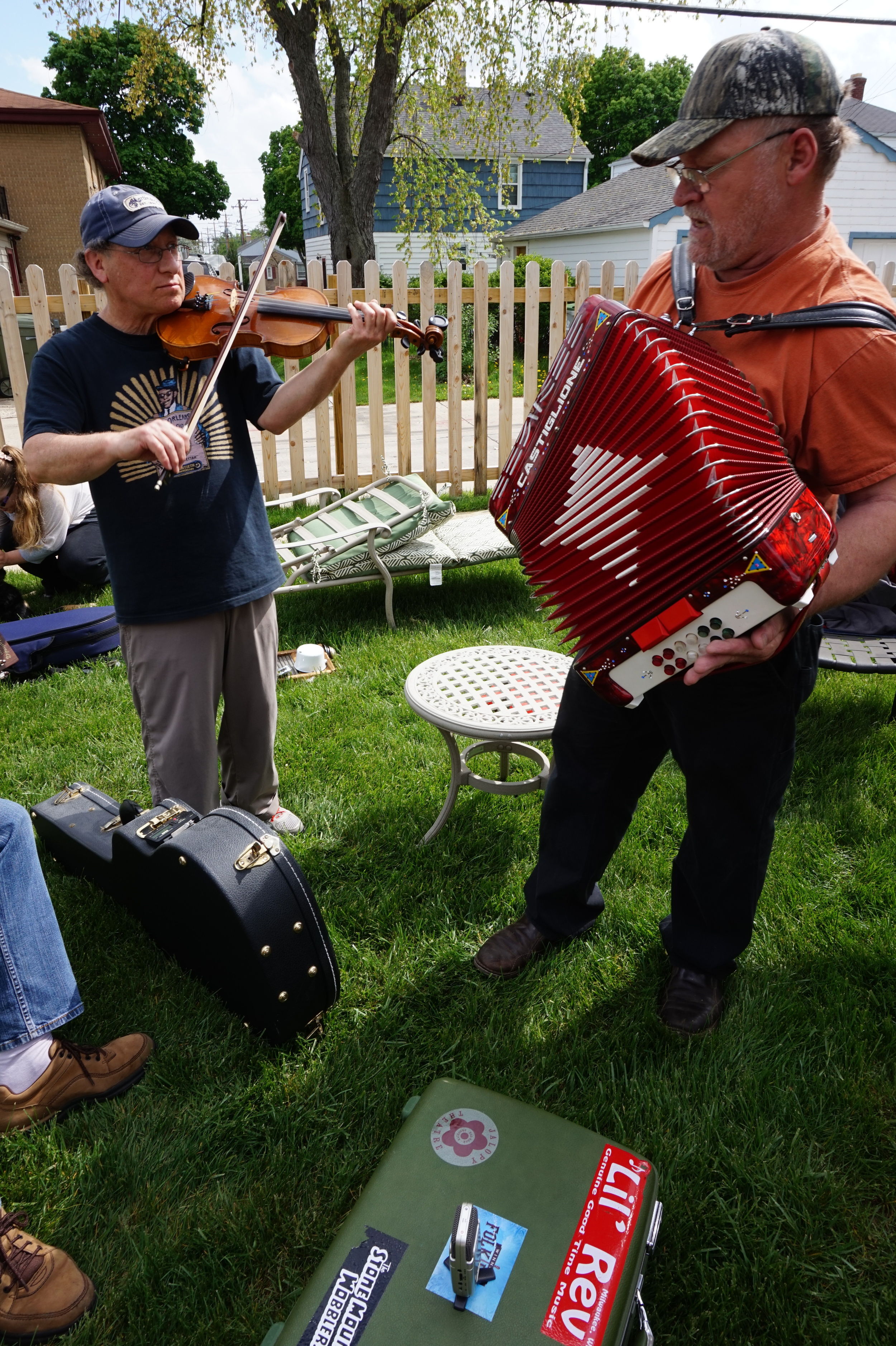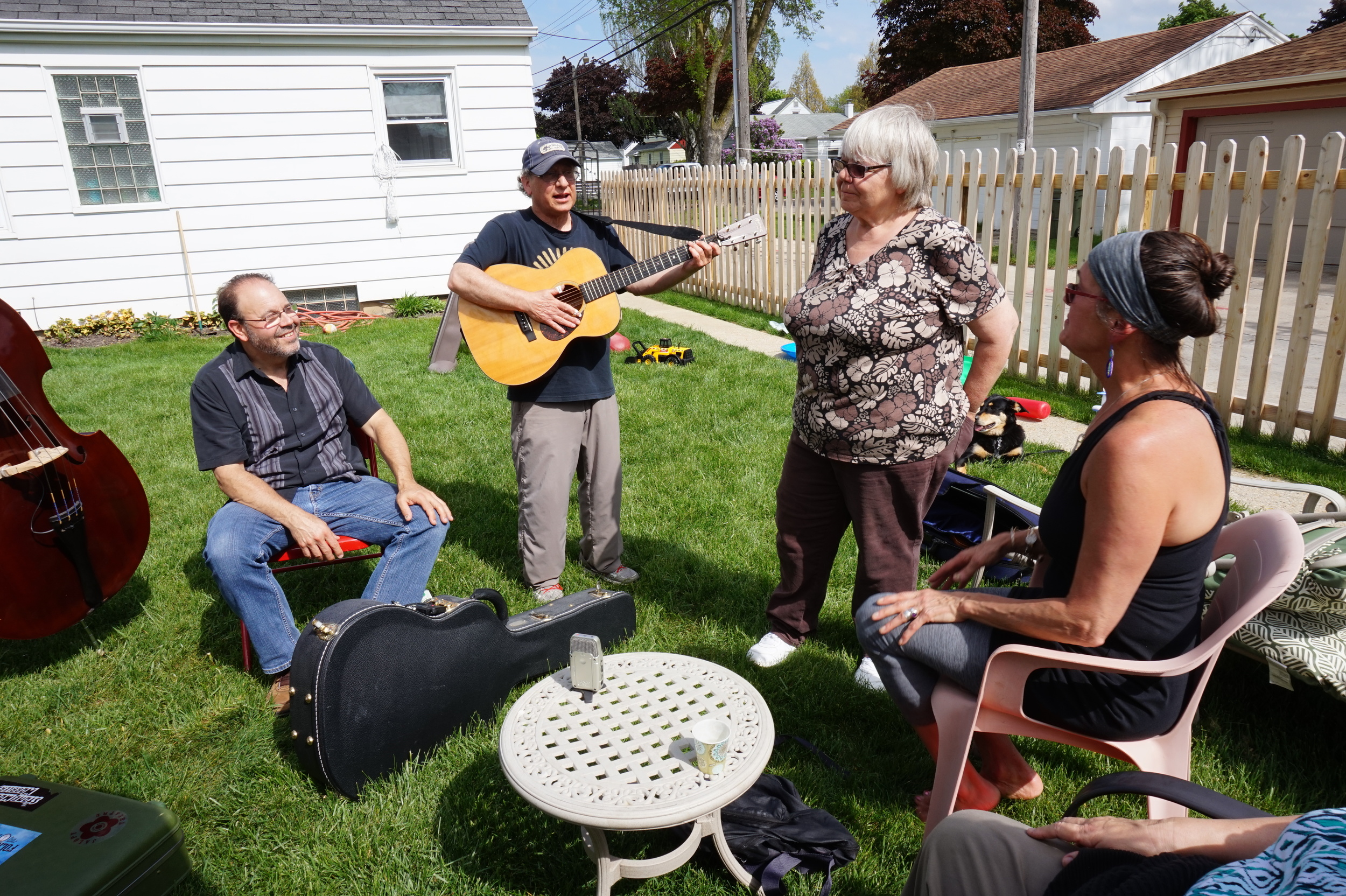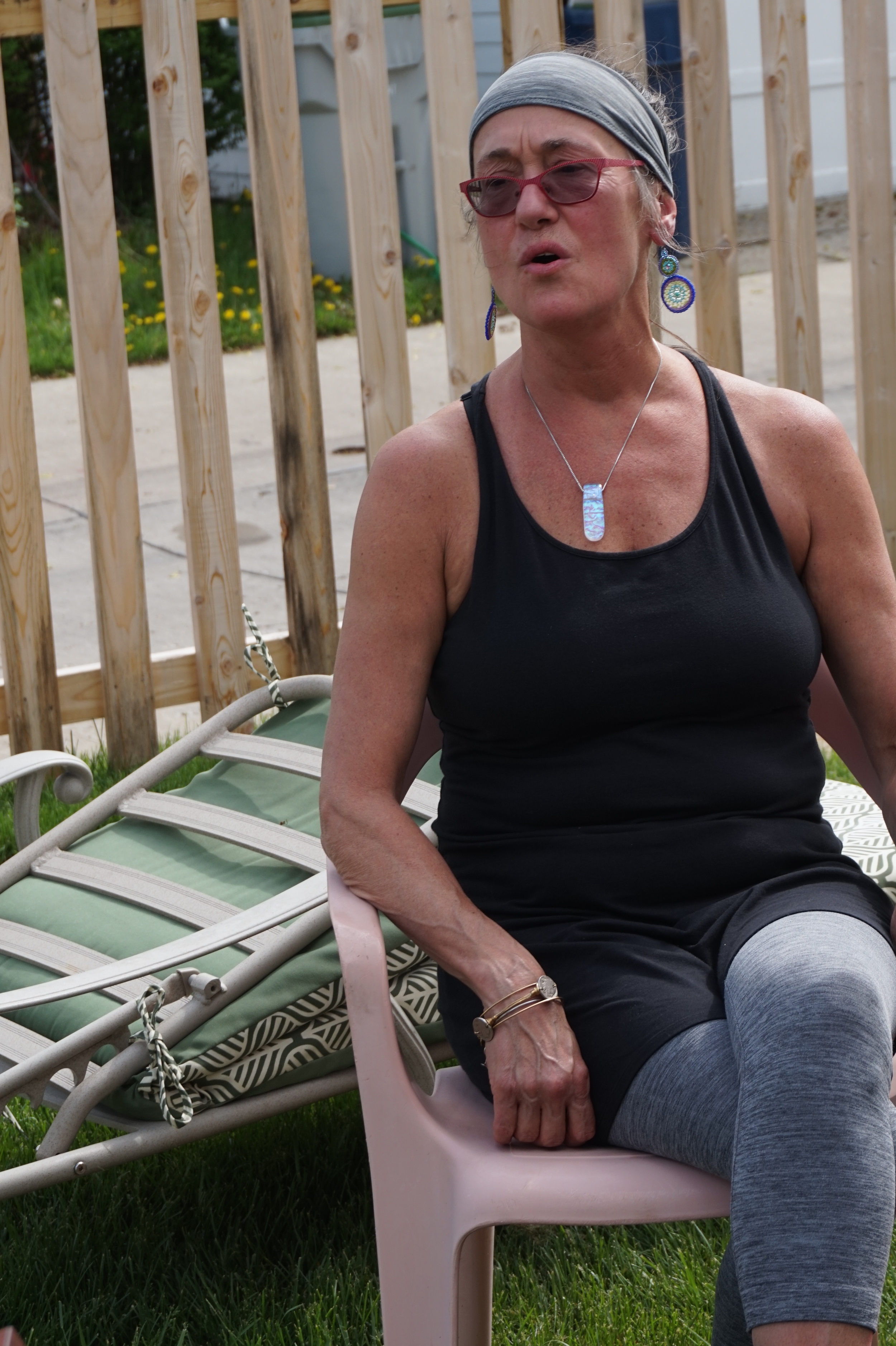May 2015: The True Value of Music
This month I had the privilege to head back home to Milwaukee with Gabe and the kids for a music party in my parents' backyard. The "music party" is something I grew up with, a loose get-together of people with acoustic instruments, taking turns leading songs that most know, or are at least familiar with - real, honest-to-goodness folk music. Growing up, my parents' social life almost always involved music, and most of their friends were (and still are) musicians. There's nowhere near enough room here to really describe how important this way of spending time with people is to me, but I will say that if you boiled down to its essence everything that's important to me, everything that I think is right and wonderful about being a human, it would be this very basic experience - sitting in a room with people you love (or maybe just like, or maybe not even really like that much at all) making music for no one but each other, and for no other reason than that it's what makes you (individually, collectively) you. Nothing to be gained except maybe a new favorite song and a real connection with other people, and nothing to be lost except time. Other than dancing (which frequently accompanies the music), I can't think of another activity that so purely expresses the transcendence of our collective humanity. And when I hear the phrase "real America" used by politicians or pundits or bigots, this scene always pops into my head and I think, "That's the real America."
(Photos by Gabrielle Lyon)
I know that there are pockets of folk scenes like this all over the country, with varying levels of sophistication and talent, but they're rare, or at least a hell of a lot rarer than they used to be. As I grew up, left home and went to college, and got to know people from all over, I realized how unbelievably privileged I am to have grown up this way, especially in the late 20th century. As I get older, and watch my parents and their generation get older, I appreciate it more and more. I feel it slipping away and I've begun to covet these experiences, whether it's just my mom and dad and me in the kitchen, or a big group of people in the backyard. I want to share it with my friends and newer family, in order to explain (in a way I never could with words) who I am, and to give them the chance to experience it for themselves.
This party was especially meaningful for me because the group that was gathered was like the "all-star" team of my childhood, the people who have been friends of our family for the longest, all of whom I've known literally as long as I can remember. I don't see them often, but when I do there's an instant, deep, and unshakeable connection.
It was also precious for me because the kids were there to be a part of it. Gabe's daughter, who is in fifth grade, has been playing the violin this year, and has made it clear that she's interested most of all in fiddling. She plunked herself right down in the middle of the action and took it all in. During a break between songs she piped up with her typical directness, asking "So how does this work? Do you just start playing a song or something?" The amazing thing is, I don't think anybody had a definitive answer to that question. I started thinking to myself, "Wait, how does this work exactly?" It's not like there are rules or anything. Then, without batting an eye, a group of people who have been playing music for forty years stopped what they were doing, said, "Sure. Is there something you want to sing?," and quietly listened to her shyly murmur a short song she said she learned from listening to other kids at school. A few minutes later, my dad handed her his violin and we all stumbled along with her as she played something from her violin class at school. That's... just. I was so proud, of her, of them, of us. Nothing and everything all at once. Profound, unvarnished, over in a minute and never to disappear.
Reading about Tidal, the new(ish) streaming service headed by Jay Z, I was left with an incredibly sour taste after a particular statement he made in an interview with Billboard on the day of Tidal's launch back in March. Explaining the need for Tidal, (which purportedly aims to offer more artist-created content, high-quality streaming, and higher royalties for artists), Jay Z reflected on the state of music consumption. Prompted by a question about people paying significantly less for music than they used to and the goal of "resetting the value proposition of music," he says "People are not respecting the music, and [are] devaluing it and devaluing what it really means."
Now, there's a lot of what he says in the interview that I agree with, and I want to believe that his claim to be interested in making sure the heightened revenue model trickles down to non-millionaire artists is sincere. But, the idea that one's esteem for music is equal to how much one pays - that's just horseshit. It's a horseshit idea that's all over the current conversation about streaming and the economics behind it, usually spouted by people with the most power and the most money.
Imagine a person. This is person who listens to music all day long, who listens hard, and dances hard, and thinks about it, studies it, learns it, shares it, and loves it. This also happens to be a person who only listens to the free version of Spotify, or gets all of there music off of bit torrent. Is this a person who doesn't value music?! That's just absurd.
Processing why this line of thinking gets me so hot under the collar, I started thinking hard about the scene I describe above. A group of people with a lifetime of trading music between each other, with not a cent exchanged. Do the people in the photos above look like they don't value music?
The real problem here is that the conversations like the one Jay Z (and so many others) is having isn't actually about music, it's about the music business, with a heavy emphasis on the business. They're talking about products, not art. Never mind the problem with essentially equating music with breakfast cereal or shaving cream, this conversation betrays an even deeper and more troubling misunderstanding in our culture: That who we are as people - what we value - is demonstrated and defined by what we spend money on. That our most important role is that of consumer.
It's just the most rotten idea around, and I, personally, am against it with every fiber of my being. I'm against the natural outgrowth of this idea - that people with less money have less value, and I'm against the mind numbing, soul sucking, and environmentally destructive effects of this idea that are wreaking havoc in our world.
Who we are and what we value is demonstrated by what we spend our time doing and thinking. Time and attention are our most precious commodities, not money. Who we spend time with, what we spend time doing - that is how you tell the world and yourself who you are.
Is it unfortunate that musicians are having a more difficult time making a living from their art than they did 10 or 20 years ago? Absolutely. Is there anything wrong wanting to be able to make a living from one's music? No way. But these things are not quintessential elements of music. They are important, but secondary.
I believe there's an equal and balancing outcome in all of the change that is happening in the business of music now. Maybe it's just a revelation of what's always been around anyway - a broad, enthusiastic community of musicians and music lovers who see the changing technology not as a threat, but as an opportunity. An opportunity to do something that truly shows the value of music: sharing it. A community of people who want something more than for you to pay, they want you to listen. Or, even better, join in. That's what music is for, after all. Right?
B.B. King - How Blue Can You Get? When B.B. King passed this month I remembered that among all of my dad's great stories about meeting blues musicians when he was young was a story about meeting B.B. King. I got him on the phone and asked him to tell it to me again.
"It was probably 1967, I would have been around 18. I was managing the University of Wisconsin Folk Arts Society in Madison, and booked B.B King to come play there. I think we were probably one of the first colleges he played, or at least that was something fairly new for him. It was in the Union Theater, in the University of Wisconsin student union. That’s a Frank Lloyd Wright-designed theater where we held events.
What happened was, the audience was in the theater waiting for the show to start, and there was no B.B. King in sight. I was backstage with some other people from the Folk Arts Society, and no B.B. King. We were standing outside watching for him by the stage door, the performers entrance, and this huge beater pulls up full of people and equipment. And out steps B.B. King. I went up to him and said, “Mr. King, I’m Mr. Fox.” He thought that was just hilarious. This 18 year-old kid. But he was very polite.
Since they knew they were late, he told the band to go inside and change. He brought all the equipment in himself and set it up onstage. Then the band came out to warm up the audience and he went in the dressing room and got ready to play.
The whole story was that his band’s plane connection got screwed up. So he landed in Chicago and picked up a band – a pick-up band, you know. They drove from Chicago. I don’t know if these guys had ever played with him before, but they knew his material.
Then he came out and played two shows. In between the shows we were all in the dressing room. He was sitting back there, perfectly relaxed, just kind of holding court. He was the first person I ever saw with processed hair. He had it all wrapped up so that it would stay in place. He talked to us about all his woman problems and that kind of thing.
In those years his playing and singing was nothing short of electrifying. You’d almost have to stand up out of your seat, with some of the licks he played. He was just really great.
I got a signed photograph, and it says 'Mr. Fox - Thanks, B.B. King'.
I saw him three times during the sixties, and each time he played a little differently. He was working very hard studying guitar in those years, trying to improve. B.B. was a truly great musician and a wonderful, honest, and straight-forward person. He was an American master and left a lasting impression on me."
Grateful Dead - Casey Jones My brother Steve came for a short but sweet visit this month, and distracted me from particularly aggravating traffic with a tour through his ongoing "Mediocre Classic Rock" playlist and his "Head Set Jams" playlist. He's on a serious Grateful Dead tear these days. Serious enough that he actually got a promotional email from Spotify pointing out that he's one of the top GD listeners on Spotify and offering him a chance to enter a contest to win concert tickets. That can't be a small feat. While I'll probably always retain some of my Grateful Dead skepticism, I will acknowledge that there's plenty of great stuff like this song.
Drinks - Hermits On Holiday A new collaborative project from Faux Sounds favorite Cate Le Bon, this one with Tim Presley, aka White Fence. This song's a grower for sure, and, like all of her stuff, not for everyone. Personally, I could listen to her read html code all day and never get tired of her voice.
